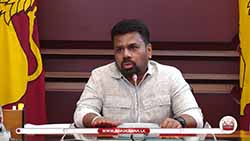‘Office of Missing Persons is practically untouchable by even the Supreme Court’
July 25, 2017 09:01 am
Former President Mahinda Rajapaksa stated that even though the Office of Missing Persons (OMP) was technically an ‘office’, Section 12 of the OMP Act made it clear that it would in actual fact be a tribunal capable of receiving complaints, carrying out investigations, examining witnesses, issuing summons and holding hearings.
He added that its officers would be able to enter any police station, prison or military installation without a warrant at any time, and seize any document or object they required.
The former President stated this in an open letter addressed to the Mahanayake Theros and the Maha Sangha yesterday (24), where he drew attention to certain provisions of the Office of Missing Persons Act No. 14 of 2016, as amended by the Office on Missing Persons (Amendment) Act, No. 9 of 2017, which was recently given effect to under the authority of President Maithripala Sirisena on the grounds that it was a “major step towards reconciliation”.
Mahinda Rajapaksa explained in his letter how the OMP act would enable the OMP to receive funding even from pro-LTTE Diaspora organizations that had not been banned, and how the Act included a provision that overpowered all criteria laid down in the Evidence Ordinance.
He also explained that the provisions of the Right to Information (RTI) Act would not apply to the Office of Missing Persons.
Furthermore, all officers of the OMP have been granted complete immunity from civil and criminal liability for any act or omission on their part or the contents of any report they may publish, he said.
According to the Act, nothing that the OMP does can be called into question by any court of law except the Supreme Court.
However, Section 15 of the Act reportedly enables the OMP to withhold information, making it practically impossible for the Supreme Court to call the OMP into question.
Rajapaksa also explained that anyone who failed to or refused to cooperate with the OMP may be punished as if it were an act of contempt against the Court of Appeal.
Former President Rajapaksa stated that the Office of Missing Persons was one of several institutions that the Yahapalana Government had agreed to set up to ‘deal with the past’, and added and its purpose was to “feed information to other mechanisms.”
The former President then proceeded to state that the government had recently introduced a Bill to incorporate into local law the contents of the International Convention Against Enforced Disappearances, which allowed foreign countries to request the extradition of persons suspected of being responsible for enforced disappearances in Sri Lanka to be either tried in that foreign country or handed over to an international criminal tribunal for prosecution.
He explained that the debate on the Bill had been postponed as a result of the objections raised by the Maha Sangha and the public, but that the Government had announced that the withdrawal was only temporary, and assured that the Bill would be reintroduced to the Parliament in due course.
He said that the Government had then proceeded to attempt to falsely justify the Bill by stating that it would apply only to the future and not the past, which he declared to be an “outright lie”, explaining that under the Constitution, it would automatically be made applicable to the past.
Rajapaksa also remarked how the various laws introduced by the Yahapalana Government complemented one another.
“In August last year, the OMP Bill was bulldozed through Parliament by the United National Party (UNP), the Sri Lanka Freedom Party (SLFP) government group, the Janatha Vimukthi Peramuna (JVP) and the Tamil National Alliance (TNA), despite the objections raised by the Joint Opposition (JO),” he said in his open letter, and proceeded to reveal that less than 40 minutes had been granted to debate the new law.
Drawing his open letter to a close, Rajapaksa stated that the Yahapalana Government had sought to give interested foreign powers a central role under our own law, in the persecution of armed forces and political authorities that gave leadership to the war through the new laws they had already passed or placed before Parliament.
Accordingly, signing off, former President Mahinda Rajapaksa requested the Mahanayake Theros and the Maha Sangha to give due consideration to these “acts of betrayal being committed under the guise of promoting reconciliation.”












